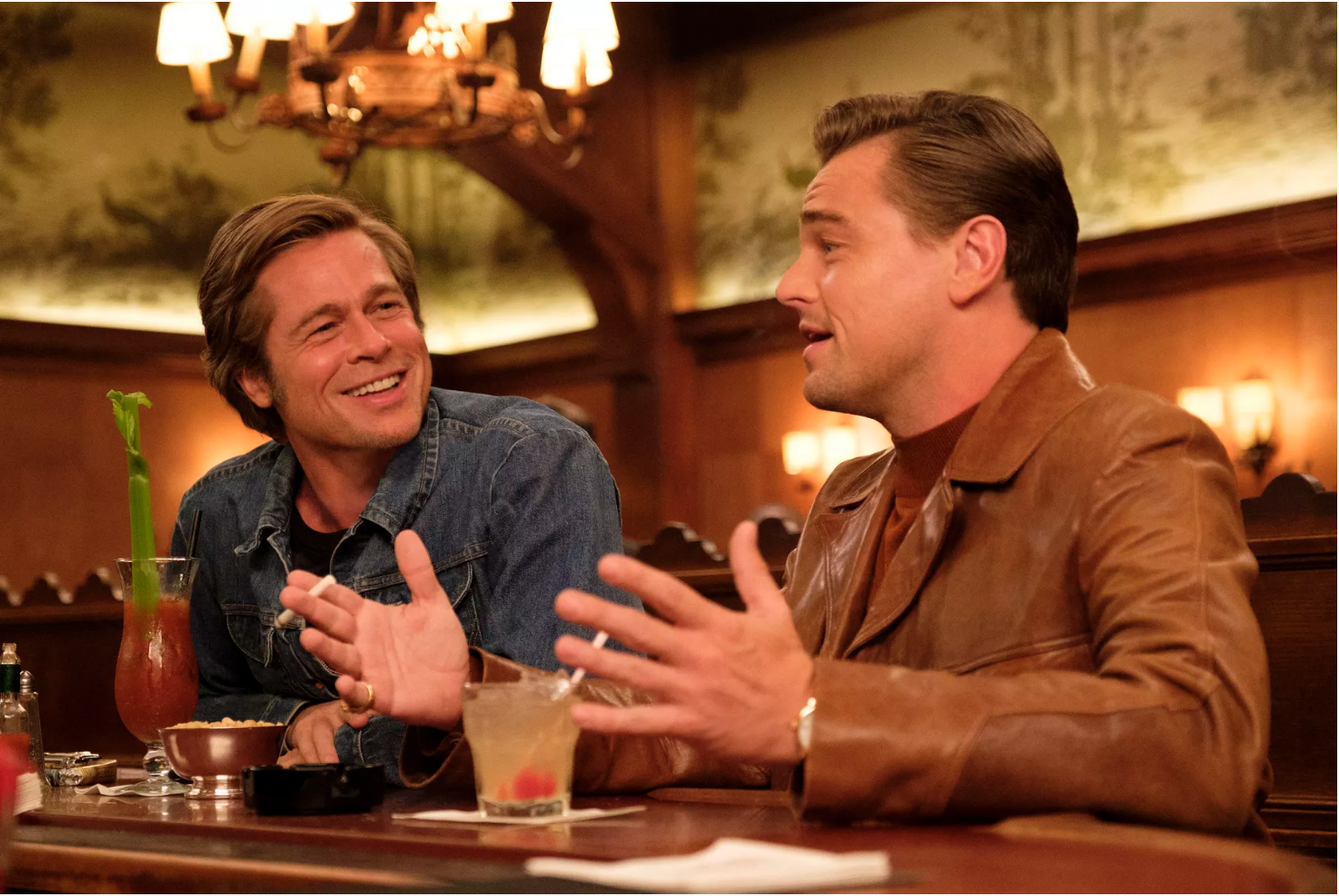Burn, Hollywood, Burn
A regular review by John Black
In his latest flick Once Upon a Time in Hollywood, Quentin Tarantino discovers Old-Man-At-The-BBQ-Who’s-Had-One-Beer-Too-Many variety Conservatism. The thematic takeaways are what Conservatives have been saying for ages (at BBQs and elsewhere): Hollywood is a playground for moral degenerates, actors are preening narcissistic idiots and hippies are evil.
Unfortunately, the arrival of this wisdom as it often does in life coincides with flabbiness, indulgence, nostalgia, and a serious foot fetish. Well, the last may be unique to Tarantino, but I wouldn’t judge until you’ve seen Margot Robbie shoeless.
The tale takes place in Hollywood leading up to the night of the Manson family murders. The actor, Leonardo DiCaprio displaying his well-known range, plays the actor, Rick Dalton. Brad Pitt is Cliff his enigmatic stunt man/gofer and rumoured to be an uxoricide (look it up and learn something, I did) and Margot plays the real-life Manson murder victim, Sharon Tate.
The plot if you can dignify their meanderings with that term sees Rick struggling for success in T.V bit parts while Cliff fixes T.V aerials, feeds his dog and reminiscences about kicking Bruce Lee’s ass once.
Meanwhile, Tate dances around a lot and goes to the cinema. Now personally, this reviewer could watch the delightful Margot Robbie dance for quite some time without complaint (except perhaps from my wife) but I wouldn’t call it a movie. The only tension or plot progression comes from the lead characters random interactions with the Manson ‘family’ (a deeply ironic term for Charlie the pimp and his collection of lost girls).
It all looks fantastic, and the production designer should have their Oscar speech ready, with the seedy, cheap glamour of late 60’s Hollywood brilliantly, if expensively (budget: $90 million) reconstructed. This, however, is the downfall of the film – Tarantino’s obsession with Hollywood. Previously his movie fixation has given his work resonance as the audience bought into his entertaining riffs on the genre. The gangsters in Pulp Fiction discussing foot massage etiquette or the stoic war heroes of Inglorious Basterds (‘Say auf wiedersehen to your Nazi balls!’) work because we already have Goodfellas or The Dirty Dozen in our heads. Most of us don’t have a similar connection to movies behind the scenes. Rick Dalton is a spoilt alky pretty boy with a swimming pool, who the hell cares if he doesn’t get a part in some movie? In fact, the wallowing of Rick is so pathetic, and unfunny, that I can only assume Tarantino was trying to underscore the shallowness of the acting fraternity, something most of us on this site will be convinced of already. Devoting a substantial portion of the film’s 2 hours and forty-five minutes to make this point, makes Tarantino seem as self-indulgent as the character.
Much has been made of the blood-soaked finale, but here Tarantino’s movie myopia does him (and us) further mischief. The real Manson murders were motivated (as much as motivations can be attributed to an A-grade loon like Manson) by his desire to provoke a ‘race war’. Manson chose the Hollywood homes of the white elite so that the victims would be high profile enough to start his prophesied racial revolution. Tarantino makes it all about the movies. One of Manson’s psychotic hippy girls says she wants to ‘Kill the people who taught us to kill!’ an odd concession perhaps to the idea that Hollywood bears some responsibility for real-life violence. With all the baby-boomer nonsense currently in the media about the fiftieth anniversary of Woodstock, it is pleasingly cathartic to see the movie end with an orgy of hippie killing.
For much of his career, Tarantino has had impeccable liberal cred. He was particularly vocal during protests over police killings of black Americans (later proven to be a lot to do about nothing).
Lately, though his lefty bona fides have been in doubt, with #metoo allegations over the treatment of actresses and claims of sexism in his movies. Time magazine (of all publications!) actually published a piece adding up all the dialogue spoken by men and that spoken by women with suitable outrage at the skewed result.
Perhaps being put through the liberal wringer has red-pilled the man. Previously, if his films could be said to contain any morality at all it was the morality of ‘cool’. Ezekiel quoting hitmen, lady assassins, and Nazi scalping soldiers were the closest he got to heroes, entertaining, VERY entertaining but with not much daylight between them and the villains.
In contrast, in Once Upon A Time in Hollywood something like a moral vision can be found, with more distance between Cliff and the evil Manson freaks in the climax, a critique of 60’s counter-culture and a depiction of Hollywood as unremittingly shallow.
It’s just a pity this thematic growth comes at the expense of entertainment.
Tarantino has said he plans to only make one more movie in his career. For the sake of his legacy, this fan hopes that’s more a promise than a threat.

